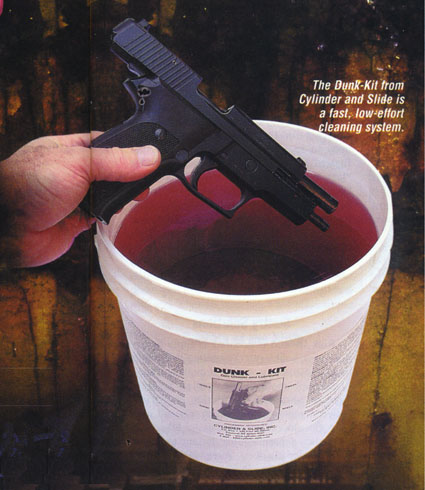|
When I
was young, I cleaned my guns with an almost religious
fervor. When I got in from a day of hunting, especially
in rough weather, I cleaned my guns before I ate. A
cowboy took care of his horse before he took care of
himself, didn't he? Same deal.
That was then. This is now.
Did I
become complacent? Lackadaisical? Maybe just old?
I dunno.
I don't wanna know. All I know is I don't have nearly as
much time to clean guns as I did in my younger days.
This
doesn't mean that my guns are filthy. I keep them in
good working order. I have to: It's part of my job
description. It just means I'm not obsessive about
cleaning them anymore.
Call me
lazy. I won't deny it. But if I'm lazy, there's method
to the madness. We all know the rifleman's creed:
"Without me, my rifle is nothing. Without my rifle,
I am nothing." Well, let's just say I figure my gun
is here to take care of me more than I am here to take
care of the gun.
Cleaning
a gun can be a great "leisure thing" for
people like us. The thorough disassembly and meticulous
cleaning of each part is an effective stress-reliever
when we have time to kill. When we don't have much time
though, all that's required is to get the crud out, make
sure there's nothing in the way of moving parts or
rounds, and get the thing back to work. Let's look at
some different minimalist approaches to gun cleaning.
Base
Line
Talk to
the guy who wrote the book on it. Marty Hayes is the
author of The Professional's Guide to Handgun Cleaning,
published by the Firearms Academy Of Seattle in 1992 and
due to appear as a new edition in 2002. It costs $9.95
plus $3 postage, and is worth the price.
Marty
told me, "I could probably get by with a good
cleaning rod. bore brush, nylon toothbrush and
Break-Free, along with some rags. It's better to have
solvent, but if you're going to be absolutely
minimalist, Break-Free has a cleaning function as well
as a lubrication function."
Living as
he does on a training range (when you order the book,
ask for info on the excellent courses at Firearms
Academy of Seattle), Marty normally cleans his guns in
great detail and uses a kit that resembles something a
carpenter might carry to a construction site. For what
you need to "just get you through the night,"
though, I think he's got it nailed down.
|
A
Drop In The Bucket |
|
Several
years ago, I ran across Bill Laughridge's
Dunk-Kit and instantly fell in love with it.
It's this, like, bucket of oil stuff. Ya strip
your gun, slosh the parts around in it, and
cleaning is, like, over real quick.
Well
maybe Laughridge can say it better than I.
"It's a
petroleum based," says Bill, "with no
acetones or any other chemicals on the 'badlist.'
It will discolor wood and eat through rubber or
similar substances, so take your
grips off |
 |
when you put the gun
in. All you have to do is field strip your auto and put
the assemblies in to soak for three to five minutes. You
might want to agitate the frame a little to let carbon
wash away. Then, tooth-brush the frame. That's it."
With your
revolver, advises Bill, "Just take the grips off
and put it in for five minutes, then reach in and cycle
the action a few times under the surface. That will
flush the guts of the revolver clean. Wear safety
glasses, so that cycling the gun doesn't splash anything
into your eyes."
Truly
massive lead deposits should be brushed out of barrel
and chamber as best your can before inserting them in
the bucket of Dunk-Kit. After removal, a much quicker
brushing should leave everything smooth and sparkly
clean. If the lead has really gunked things up, Bill
suggests swabbing barrel and chambers) with his special
Deleading Wool.
You can
get three-quarters of a gallon of Dunk-Kit for $32.95. A
1/4-gallon bucket is the most popular and perhaps the
best balance of ease of dunking with ease of storage at
$49.95. For those with massive gun cleaning chores, or
those de-carbonizing their shotguns or their AR-15
lowers, the best bet is the 4-gallon container at
$94.95. All prices include freight paid in the
continental U.S.A. That De-Leading wool is $4.25 per
package. Bill finds that a bit of it on a cleaning rod
jag will clear the most stubborn accumulations in a
half-dozen passes. (These prices have changed, since
the publication of this article, please visit our online
store for the latest prices)
Bill
assures us that the solution won't harm night sights,
and that the polymer frames of Glocks are "Dunk-Kit
proof." He was surprised when I told him that a
friend of mine swears the polymer frame of his old HK
P95 pistol was shriveled like a prune when he pulled it
out of the Dunk-Kit after an overnight bath.
Note also
that Dunk-Kit doesn't need to be dumped until it reaches
the consistency of crankcase oil, which takes about a
year of heavy use. When that happens, it can be dropped
off at any service station that is set up to recycle
waste oil. Note that if you are allergic to petroleum,
you should use nitrile gloves, available at any hospital
supply store. This stuff will eat through regular rubber
gloves. For ordering info, you can reach Laughridge's
Cylinder & Slide Shop at [8001 448-1713].
|